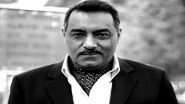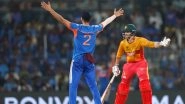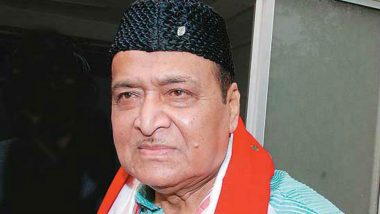New Delhi, January 25: Singer and cultural icon Bhupen Hazarika, former President Pranab Mukherjee, Bharatiya Jana Sangh leader Nanaji Deshmukh will be conferred the country’s highest civilian award Bharat Ratna, an official statement said Friday. Bhupen Hazarika, a legend from the field of arts and cinema, has been awarded the honour posthumously. Hazarika passed away in the year 2011 and was a remarkable singer, songwriter, folk artist and a cultural icon, whose passing away was mourned by millions. He was also a scholar and a social activist, who kept striving for the people and tribals of Assam. Pranab Mukherjee To be Conferred With Bharat Ratna Along With Nanaji Deshmukh and Dr Bhupen Hazarika.
Bhupen Hazarika was born on September 8, 1926 and passed away on November 5, 2011 was an Indian playback singer, lyricist, musician, singer, poet and film-maker from Assam, widely known as Sudhakantha. His songs, written and sung mainly in the Assamese language by himself, are marked by humanity and universal brotherhood and have been translated and sung in many languages, most notably in Bengali and Hindi. Nanaji Deshmukh Conferred Country’s Highest Civilian Award Bharat Ratna Posthumously, Know More About the Leader Who Served Rural India.
His songs, based on the themes of communal amity, universal justice and empathy, have become popular among the people of Assam, besides West Bengal and Bangladesh. He is also acknowledged to have introduced the culture and folk music of Assam and Northeast India to Hindi cinema at the national level. His most famous rendition on Brahmaputra, which was sung in Hindi as Ganga behti ho kyun, moved people to tears. Bharat Ratna For Pranab Mukherjee, Nanaji Deshmukh & Bhupen Hazarika; PM Narendra Modi, Union Ministers Congratulate and Remember Recipients of India’s Highest Civilian Award.
The eldest of ten children, Bhupen Hazarika was exposed to the musical influence of his mother, who exposed him to lullabies and traditional Music of Assam. His father moved to the Bharalumukh region of Guwahati in 1929, in search of better prospects, where Bhupen Hazarika spent his early childhood. Pranab Mukherjee, Former President, Awarded Bharat Ratna; Know Journey of The Leader Who Became a Statesman.
In 1932 his father further moved to Dhubri, and in 1935 to Tezpur. It was in Tezpur that Bhupen Hazarika, then 10 years of age, was discovered by Jyotiprasad Agarwala, the noted Assamese lyricist, playwright and the first Assamese Filmmaker and Bishnu Prasad Rabha, renowned Assamese artist and revolutionary poet, where he sang a Borgeet (the traditional classical Assamese devotional songs written by Srimanta Sankardeva and Sri Sri Madhabdeva), taught by his mother at a public function.
In 1936, Bhupen Hazarika accompanied them to Kolkata where he recorded his first song at the Aurora Studio for the Selona Company. His association with the icons of Assamese Culture at Tezpur was the beginning of his artistic growth and credentials.
Subsequently, Hazarika sang two songs in Agarwala's film Indramalati. Kaxote Kolosi Loi and Biswo Bijoyi Naujawan at the age of 12. He wrote his first song, Agnijugor Firingoti Moi at the age of 13 and he was well on his way to becoming a lyricist, composer and singer.
Hazarika studied at Sonaram High School at Guwahati, Dhubri Government High School and matriculated from Tezpur High School in 1940. He completed his Intermediate Arts from Cotton College in 1942, and his BA (1944) and MA (1946) in Political Science from Banaras Hindu University. For a brief period he worked at All India Radio, Guwahati when he won a scholarship from Columbia University and set sail for New York in 1949. There he earned a PhD (1952) on his thesis "Proposals for Preparing India's Basic Education to use Audio-Visual Techniques in Adult Education".
In New York Bhupen Hazarika befriended Paul Robeson, a prominent civil rights activist, who influenced him in his song Bistirno parore which is based on the imagery and theme of Robeson's Ol' Man River. This song is translated in various Indian languages, including Bengali and Hindi and sung by the artist himself, and is still popular.
Being inspired from some other foreign ones, he also composed several other songs in Indian languages. He was exposed to the Spiritual, and the multi-lingual version of We are in the Same Boat Brother became a regular feature in his stage performance. At Columbia University, he met Priyamvada Patel, whom he married in 1950. Tez Hazarika, their only child, was born in 1952,and he returned to India in 1953.
A statue of Assamese music icon Dr Bhupen Hazarika, who brought the Northeastern region to the rest of the country through his songs, was unveiled in Arunachal Pradesh, only last year. The statue has been constructed in Bolung in Lower Dibang Valley district is the birthplace of the legendary singer, composer, and film maker of Assam.
Unveiling the 10.5 feet tall bronze cast statue, Arunachal Chief Minister Pema Khandu said, “Hazarika served as a bridge in uniting all the sister states of the North East and even patronised to spread the unique culture of the region to the outside world.”
He composed songs on each tribal communities of the state, the chief minister said. During the Chinese aggression of 1962, Dr Hazarika visited the war front at Kameng sector and wrote a song to boost the morale of the soldiers, Khandu said.
Terming Hazarika as a bridge for cultural integration, he said the state government would propose to introduce Assamese as the third language in the schools of the state.
“During the NEFA days, most of the people used to obtain education in Assamese medium due to lack of schools and Hazarika made the language popular through his songs which are still being sung by people in the state, Khandu said.
The North-East Frontier Agency (NEFA) was a political division in British India, which later became the state of Arunachal Pradesh. “Hazarika can be considered as an encyclopaedia of the Northeast as through his songs people can understand the rich cultural legacy of each state of the region,” Deputy Chief Minister Chowna Mein said at the programme where Hazarika’s family members were also present.
Assam minister Tapan Gogoi, who represented the government of the neighbouring state, said a cultural integration centre in the name of Hazarika would be set up near the Dhola-Sadia Bridge in Assam’s Tinsukia district.
In the year 2017, Prime Minister Narendra Modi dedicated the Dhola Sadiya bridge to Bhupen Hazarika and the bridge is formally known as Bhupen Hazarika setu. It is India’s longest bridge at 9.15km, reduce travel distance by 165 km and boosted Tourism and Defence.
PM Narendra Modi tweeted about the singer saying, "The songs and music of Shri Bhupen Hazarika are admired by people across generations. From them radiates the message of justice, harmony and brotherhood. He popularised India's musical traditions globally. Happy that the Bharat Ratna has been conferred on Bhupen Da." Samar Hazarika, late musician Bhupen Hazarika's brother said that "We're grateful to central & Assam govt. They've given him the highest honour. Before his death also, there has been a constant demand for Bharat Ratna for him from Assam. GoI has fulfilled our demand so we're really happy."
(The above story first appeared on LatestLY on Jan 25, 2019 11:46 PM IST. For more news and updates on politics, world, sports, entertainment and lifestyle, log on to our website latestly.com).













 Quickly
Quickly


